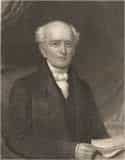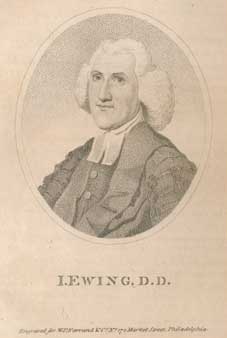A Polymath of the First Order
 The following is Dr. Samuel Miller’s reply to William Buell Sprague’s request for a biographical account of the Rev. Dr. John Ewing, who had long served as the Provost of the University of Pennsylvania.
The following is Dr. Samuel Miller’s reply to William Buell Sprague’s request for a biographical account of the Rev. Dr. John Ewing, who had long served as the Provost of the University of Pennsylvania.
Rev. and dear Brother: It gives me pleasure to contribute the least effort toward the erection of an humble monument to the memory of the Rev. Dr. John Ewing, late Provost of the University of Pennsylvania, whom I knew well, and whom I have much reason, on a variety of accounts, to remember with veneration and love.
 He was a native of Maryland, born in the town of Nottingham, in Cecil County, on the 22d of June, 1732. Of his ancestors, little is known. They emigrated from Ireland at an early period of the settlement of our country, and fixed themselves on the banks of the Susquehanna, near to the spot on which he was later born. His father was in circumstances which enabled him to give his five sons as good an education as the state of the Colonies with respect to schools could then well furnish. After the first elementary school to which he was sent, he was placed at the Academy of the Rev. Dr. Francis Alison, an eminent Presbyterian clergyman, who had emigrated from Ireland, and who was greatly distinguished for his classical literature, and who became instrumental in forming a number of excellent scholars in the Middle Colonies. His literary institution at New London, in Pennsylvania, was long celebrated. There young Ewing passed the usual course of study; and after completing it, remained three years longer in the Academy as a Tutor; directing special attention to the Latin and Greek language, and mathematics, in all which he was eminent through life.
He was a native of Maryland, born in the town of Nottingham, in Cecil County, on the 22d of June, 1732. Of his ancestors, little is known. They emigrated from Ireland at an early period of the settlement of our country, and fixed themselves on the banks of the Susquehanna, near to the spot on which he was later born. His father was in circumstances which enabled him to give his five sons as good an education as the state of the Colonies with respect to schools could then well furnish. After the first elementary school to which he was sent, he was placed at the Academy of the Rev. Dr. Francis Alison, an eminent Presbyterian clergyman, who had emigrated from Ireland, and who was greatly distinguished for his classical literature, and who became instrumental in forming a number of excellent scholars in the Middle Colonies. His literary institution at New London, in Pennsylvania, was long celebrated. There young Ewing passed the usual course of study; and after completing it, remained three years longer in the Academy as a Tutor; directing special attention to the Latin and Greek language, and mathematics, in all which he was eminent through life.
In 1774 he became a member of the College of New Jersey, then located at Newark, under the Presidency of the Rev. Mr. Burr; and, as he was so far advanced and matured in the principal studies of the College, he was graduated at the annual Commencement of the same year. At the same time he was the principal instructor in the grammar school, which was connected with the College, and spent a portion of almost every day in instructing others in the languages and mathematics. In 1756, he was chosen Tutor in the College in which he had been graduated, and continued in that station two full years, enlarging and maturing his knowledge. During this course of service as a Tutor, he removed with the College from Newark to Princeton, which removal took place in 1757. In pursuing the study of Theology, he returned to his former teacher and friend, the Rev. Dr. Alison, and was subsequently licensed to preach the Gospel by the Presbytery of Newcastle. At the age of twenty-six, before he undertook the pastoral charge, he was selected to instruct the philosophical class in the College of Philadelphia, during the absence of the Provost, the Rev. Dr. Smith. While thus employed, he received, in the year 1759, a unanimous call from the First Presbyterian Church in the city of Philadelphia, to become their Pastor. This call he accepted, and was ordained to the work of the ministry, and installed as their Pastor, in the course of that year.
About this time, Mr. Ewing formed a matrimonial connection with Miss Hannah Sergeant, the eldest daughter of Jonathan Sergeant, Esq., of Princeton,–a lady of great beauty and domestic excellence, with whom he lived in happy union more than forty years, and who survived him a number of years.
In 1773, Mr. Ewing was commissioned, with the consent of his congregation, in company with Dr. Hugh Williamson, late a member of Congress from North Carolina, to solicit contributions in Great Britain for the support of the Academy of Newark, in Delaware. His high reputation in his own country, together with an ample supply of letters which he took with him, gave him access to a number of men eminent in Church and State, in Great Britain, and prepared the way for the formation of a number of acquaintances and friendships, which were highly interesting to him, and, in some cases, valuable, as long as he lived. He seems to have made a deep impression, especially in North Britain, in favour of American character. The cities of Glasgow, Montrose, Dundee, and Perth, presented to him their freedom; and from the University of Edinburgh, of which Dr. Robertson was then the Principal, he received the degree of Doctor of Divinity. Dr. Robertson, in presenting this diploma, declared that he had never before conferred a degree with greater pleasure. At this time the contest between the Colonies and the mother country was beginning to be serious. It was, of course, the theme of much conversation while he was in England. He had frequent interviews with the Prime Minister, Lord North, and with all the intelligence of one recently from the Colonies, and with all the firmness and zeal of an ardent Whig, he warned his Lordship against the prosecution of the contest, and confidently predicted its issue; but without effect.
But the narrative which Dr. Ewing, after his return to America, was wont to give with most graphic interest, was that of his first interview with the celebrated Dr. [Samuel] Johnson, at the table of Mr. Dilly, the wealthy and hospitable Bookseller of London. Dr. Johnson, it is well known, was violent against the Colonies; had written a popular pamphlet against their claims [The Patriot, (1774)] ; and heaped upon them and their advocates the coarsest abuse. Mr. Dilly, in inviting Dr. Ewing to dinner, apprized him that Dr. Johnson was to be of the party, and cautioned him against contradicting or opposing the great literary despot. During the dinner the contest with America became the subject of animated conversation. Dr. Ewing, the only American present, being appealed to, began, with his usual frankness, to defend the Colonies. Dr. Johnson, looking at him with sternness, said, “What doyou know, Sir, on that subject?” Dr. Ewing calmly replied that, having resided in America all his life, he thought himself qualified to form and to express opinions on the situation and claims of the country. Dr. Johnson’s feelings were roused. The epithets of rebels and scoundrels were pretty liberally applied to the population of the Colonies. At length Johnson rudely said, “Sir, what do you know in America? You never read. You have no books there.” “Pardon me, Sir,” replied Dr. Ewing, “we have read the Rambler.” [a periodical published by Dr. Johnson, 1750-1752]. This civility instantly pacified him; and, after the rest of the company had retired, he sat with Dr. Ewing until midnight, in amiable, eloquent, and highly interesting conversation.
In the summer of 1775, Dr. Ewing returned from Europe. War was soon commenced between the United States and Great Britain. And he adhered to the cause of his country with all the firmness and zeal of an ardent Whig. In 1779, the Legislature of Pennsylvania revoked the charter of the old College and Academy of Philadelphia, and gave a new one, creating the University of Pennsylvania. At the head of this new institution, Dr. Ewing was placed, under the title of Provost. In this station, united with that of pastor of a church, he continued to the end of life. Besides presiding over the whole University as its head, with dignity and commanding influence, he was Professor of Natural Philosophy, and every year delivered a course of lectures on that branch of science. But this was not all. Perhaps our country has never bred a man so deeply as well as extensively versed in every branch of knowledge commonly taught in our Colleges as was Dr. Ewing. Such was his familiarity with the Hebrew language, that I have been assured by those most intimately acquainted with his habits, that his Hebrew Bible was constantly by his side in his study, and that it was that which he used of choice, for devotional purposes. In Mathematics and Astronomy, in the Lating, Greek and Hebrew languages, in Logic, in Metaphysics and Moral Philosophy, he was probably more accomplished than any other man in the United States. When any other Professor in the University was absent, the Provost would take his place, at an hour’s warning, and conduct the instruction appropriate to that Professorship with more skill, taste, and advantage than the incumbent of the chair himself. His skill in mathematical science was so pre-eminent and acknowledged, that he was more than once employed with Dr. Rittenhouse, of Philadelphia, in running the boundary lines between several of the States, in which he acquitted himself in the most able and honourable manner. He was one of the Vice Presidents of the American Philosophical Society, and made a number of contributions to the volumes of their Transactions, which do honour his memory.
Dr. Ewing had a strong constitution, and for a long course of years enjoyed vigorous health; being very seldom kept either out of the pulpit or from the Professor’s chair by indisposition. In the early part of the year 1802, he was attacked with a chronic disease, which gradually undermined his health, and finally terminated his important and useful life on the 8th of September of that year, in the seventy-first year of his age.
Few preachers in his day were more popular than Dr. Ewing, especially with the more intelligent and cultivated classes of hearers. His merits were all of the solid, instructive, and dignified character. And as a Collegiate Instructor, I suspect he had no superior.
This venerable man had a large family of children, ten or eleven of whom survived him; a number of respectable grandchildren still sustain the name and the honours of the family.
I am, Reverend and dear Brother, with the best wishes for the success of your biographical enterprise,
Very sincerely and respectfully yours,
SAMUEL MILLER.
[excerpted from Annals of the American Presbyterian Pulpit, by William Buell Sprague. Birmingham, AL: Solid Ground Christian Books, 2005. Volume One, pp. 216-219.]
Words to Live By:
1 When you sit down to dine with a ruler, consider carefully what is before you,
2 And put a knife to your throat, if you are a man of great appetite.
3 Do not desire his delicacies, For it is deceptive food.
[Proverbs 23:1-3, NASB]
